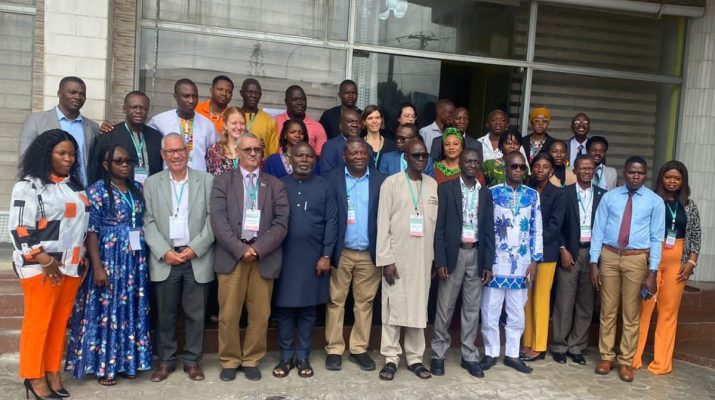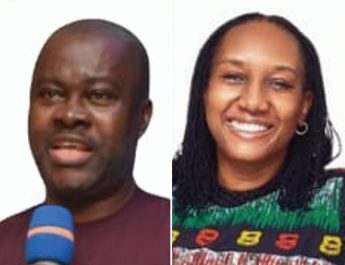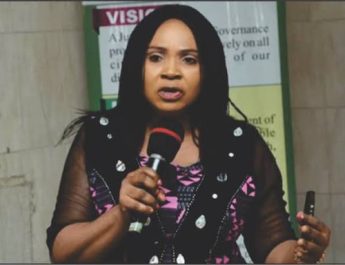In their determination to achieve sustainable environmental milestones in Africa, a coalition of over 55 civil society organizations under the auspices of the Environmental Rights Africa (ERA) elects a new leadership to drive Africa’s environmental justice agenda, just as climate crusaders passed a vote of confidence on Nigeria’s Nationally Determined Contributions (NDCs)
By Edu Abade
A Pan-African coalition of over 55 civil society organizations under the aegis of the Environmental Rights Africa (ERA), has endorsed the leadership of its newly elected Steering Committee (SC) to ensure a formidable governance structure aimed at advancing a continent-wide environmental rights agreement and protecting defenders in the frontlines of environmental crisis.
The endorsement followed ERA’s General Membership Meeting (GMM) on August 26, 2025 after the inaugural SC meeting on August 21, 2025 where Ahmad Abdallah of the Egyptian Commission for Rights and Freedoms (ECRF) was elected Chairman, while Saran Touré of Guinea’s Plaidoyer Recherche et Renforcement de Capacités des ONG emerged Co-Chairperson to ensure gender, youth and linguistic balance in its leadership.
To adequately reflect ERA’s regional and thematic diversity, its regional focal points include Saran Touré (Guinea-West Africa), Walda Keza Shaka (Uganda-East Africa), Olivier Ndoole (DRC-Central Africa), Thuli Makama (Eswatini-Southern Africa) and Abdallah (Egypt-North Africa).
Working Group leaders are Paul Mulindwa (Outreach and Advocacy-CIVICUS), Emily Kinama (Case Studies-Katiba Institute, Kenya), Lucien Limacher (Defenders Emergency-Natural Justice, South Africa), Fiona Iliff (Technical Drafting-ABA, Zimbabwe), Wanjira Mathai, MD, Africa and Global Partnerships, WRI and Philip Jakpor (Communications-Renevlyn Development Initiative (RDI) Nigeria). Francis Colee (Green Advocates, Liberia) serves as SC Secretary, while Alfred Brownell (USA/Liberia) is Lead Campaigner of the ERA movement.
In his acceptance speech, Abdallah pledged to place communities and defenders at the heart of ERA’s mission, saying: “I am deeply honored and humbled to serve as Chair of ERA, not just with gratitude, but with a profound sense of duty to our continent and our communities. Our struggle is not abstract-it is the struggle of farmers losing their lives to droughts, of coastal communities watching the sea rise, of indigenous people defending their sacred lands.
“It is the struggle of courageous defenders who face violence, intimidation and death for speaking truth to power. Our mission is to ensure these voices are not silenced, but amplified-placed at the very center of Africa’s climate agenda and environmental rights. Together, we will work for a binding African agreement to empower defenders and to write a new chapter where environmental rights are not just aspirations, but realities.”
His words captured the essence of ERA’s vision-a movement rooted not in abstract ideals, but in people, communities and lives at stake. With support of two international observers, Joseph Burke and Elizabeth Moses from ALLIED, the Steering Committee will provide strategic direction, oversee ERA’s five-year plan, mobilize resources and ensure good governance. It will also spearhead ERA’s push for a legally binding African agreement that will recognize the right to a healthy environment.
The ERA Secretariat headquartered in Monrovia, Liberia, with a core team led by Peter Quaqua (MRU CSO Platform) as Head of Secretariat, will be supported by a former UN Special Rapporteur on Freedom of Association and Assembly, Clement Voule as Strategic Advisor, Dr. Tresor Makunya (University of Goma) as Legal and Policy Advisor, while Radiatu Kahnplaye (Green Advocates) will serve as Finance Officer. All the Working Groups will function closely with the Secretariat.
In its five-year strategy, ERA revealed that over the next five years, it will pursue a strategy built on interlinked pillars including coalition building and advocacy, expanding alliances, strengthening governance and building political momentum through workshops, side events and targeted outreaches.
ERA explained that it had engaged in research and policy development by conducting over 54 national case studies to document the lived realities of defenders and vulnerable communities, as well as producing evidence-based continental reports to inform a regional treaty.
On government engagement and negotiation, the group stressed that moving from advocacy to action by initiating formal negotiations for a binding regional treaty was supported by technical expertise and public campaigns.
Looking ahead, ERA Lead Campaigner, Alfred Brownell, while acknowledging a recent $600,000 four-year grant from the Open Society Foundations, commended members who sustained the movement through its formative years, adding: “As we mark this important transition in ERA’s journey, I want to remind us of the path we’ve walked over the last four years.
“The enthusiasm, commitment and voluntarism of our members, who persevered despite daunting challenges, sustained the movement and not resources. That energy has carried us to this extent-and it will continue to drive us forward as we enter this new phase of the struggle for environmental rights and justice in Africa.”
ERA is preparing for high-level advocacy at the African Climate Summit in Addis Ababa, Ethiopia, the UN Humanitarian Conference (September 29–30, 2025 in Geneva) and the Global Peer Learning Conference scheduled for December in Kenya, alongside ongoing engagements with the African Union (AU), African Commission on Human and Peoples’ Rights, UN Economic Commission for Africa and United Nations Environment Programme (UNEP).
With renewed the leadership and momentum, ERA is poised to strengthen its visibility, deepen advocacy and unite Africa’s defenders under one powerful movement for justice, accountability and environmental rights for the continent.
Meanwhile, climate crusaders and environmental activists have passed a vote of confidence on Nigeria’s Nationally Determined Contributions (NDCs) 3.0, describing it as a step in the right direction.
They stated this at the National Stakeholders’ NDC 3.0 Validation Workshop organized by the National Council on Climate Change (NCCC) in Abuja to present an update of Nigeria’s NDCs in preparation for the National Executive’s approval and eventual submission to the United Nations Framework Convention on Climate Change (UNFCCC) on August 27, 2025, with stakeholders from across multiple sectors as a hybrid engagement.
Resident Representative of United Nations Development Programme (UNDP) Nigeria, Mrs. Varsha Redkar-Palepu, who was at the event, described the NDC 3.0 as sharper in emission reduction target and deeper in integration of critical segments of the society including the youth, women and sub-national voices.
Redkar-Palepu explained that Nigeria’s journey through NDC 1.0 and 2.0 has laid a strong foundation for its realization, pointing out that the validation of Nigeria’s NDC 3.0 is a pivotal moment and a milestone that reflects Nigeria’s unwavering commitment to climate action and its leadership in shaping a sustainable future for Africa and the world.
She maintained that although Africa contributes the least to global emissions, the continent remains disproportionately vulnerable to climate shocks, adding that it is also a continent of immense potential with rich natural resources, youthful energy and innovative spirit. Even with this, she stressed that Nigeria, as the largest economy and most populous nation in Africa, carries a unique responsibility and opportunity to lead by example.
Also speaking, Senior Special Assistant to the President on Climate Finance and Stakeholder Engagement, Ibrahim Abdullahi Shelleng, said the third version of the NDC is designed to respond to the outcomes of the first Global Stocktake under the Paris Agreement, builds on lessons learned, identifies where there is need to do more and sets a clear pathway for stronger mitigation and adaptation action across Nigeria’s economy.
He maintained that under President Bola Ahmed Tinubu’s Renewed Hope Agenda, Nigeria remains committed to inclusive growth, economic transformation and social development-objectives that align seamlessly with our environmental and climate goals.
“As we unveil and deliberate on Nigeria’s NDC 3.0, it is important to underscore that this document is not just a climate commitment-it is a developmental blueprint. It reflects our national priorities in energy transition, agriculture, waste management, and resilient infrastructure, all of which are central pillars of the Tinubu administration’s policy direction,” Shelleng stated.
In his opening remarks, Director-General of NCCC, Barrister Teni Majekodunmi, urged global partners, particularly developed countries to honour their commitments under the UN Framework Convention on Climate Change (UNFCCC) and the Paris Agreement, particularly in the areas of technology transfer and support for innovation in developing countries.
Majekodunmi stressed the importance of localizing innovation by building the capacity of Nigerian entrepreneurs, researchers, and start-ups to develop technologies suitable to the nation’s climate realities.
Also speaking at the event, a conservation expert, Yakubu Kolo, who said that the states hold a crucial role in both design and implementation, called for access to climate finance for all states of Nigeria.
Kolo, who is Commissioner for Environment and Climate Change in Niger State, acknowledged that the process of developing NDC 3.0 has shown committed efforts to course-correct and be inclusive, participatory, and people-centered.
He noted that Nigeria’s NDC 3.0 must set clear ambition that reflects leadership, embed stronger adaptation strategies and ensure financing is both practical and accessible to states.
He affirmed that the NDC must be ambitious, inclusive, and credible, and must reflect the important contributions of the sub-national as the burden bearer of climate change vulnerabilities.
Those who attended the workshop included representatives from UNDP, Africa Development Bank (AfDB), United Nations Children’s Fund (UNICEF), Youth Constituency, German Corporation for International Cooperation (GIZ), United Nation Women, Global Disability Green Initiatives (GDGI), International Labour Organization (ILO), the Foreign, Commonwealth and Development Office (FCDO), as well as Non-Governmental Organizations (NGOs) and Civil Society Organizations (CSOs).




